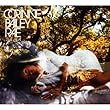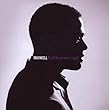 I had not known or remembered how talented Corinne Bailey Rae is; more than a unique singer—her voice can seemed to be held in the air, suspended by contemplation, savoring mood and sense—she plays several instruments, including piano and guitar (and glockenspiel, glass organ, autoharp). The first song on The Sea does not seem to end the silence that preceded it, but to extend that silence and then to slowly give it details, with Bailey Rae’s delicate voice and her piano and guitar.
I had not known or remembered how talented Corinne Bailey Rae is; more than a unique singer—her voice can seemed to be held in the air, suspended by contemplation, savoring mood and sense—she plays several instruments, including piano and guitar (and glockenspiel, glass organ, autoharp). The first song on The Sea does not seem to end the silence that preceded it, but to extend that silence and then to slowly give it details, with Bailey Rae’s delicate voice and her piano and guitar.
Author:
Masterpiece; or, The Intimate Art of Song: Love is the Answer by Barbra Streisand
 It is in Streisand’s inflections—her diction, pacing, and tone—that one can identify some of Streisand’s talent, as she remembers a love in the composition “In the Wee Small Hours of the Morning,” which Frank Sinatra sang (it was written by Bob Hilliard and David Mann, and here has a piano solo by Diana Krall, who serves as Streisand’s producer for Love is the Answer). Streisand’s inflections, like that of Sinatra, return dignity and understanding to human experience.
It is in Streisand’s inflections—her diction, pacing, and tone—that one can identify some of Streisand’s talent, as she remembers a love in the composition “In the Wee Small Hours of the Morning,” which Frank Sinatra sang (it was written by Bob Hilliard and David Mann, and here has a piano solo by Diana Krall, who serves as Streisand’s producer for Love is the Answer). Streisand’s inflections, like that of Sinatra, return dignity and understanding to human experience.
Idol Rising (Toward Individuality): The Element of Freedom by Alicia Keys, with her Unplugged collection
 (Yelling and screaming are what people who are incapable of eloquence or self-control regularly do; and artists have imitated that to indicate genuine feeling. Is that honesty, invention, or a crude, pandering sentimentality; or, is it, possibly, all of these? It is not art or craft as each has been long, traditionally understood: art has been about evolution, improvement, refinement. It is an irony that the twentieth-century modern era has used the primitive, the raw, the stupid, and the ugly as invigorating, persuasive powers; and many people are still convinced by that kind of power.)
(Yelling and screaming are what people who are incapable of eloquence or self-control regularly do; and artists have imitated that to indicate genuine feeling. Is that honesty, invention, or a crude, pandering sentimentality; or, is it, possibly, all of these? It is not art or craft as each has been long, traditionally understood: art has been about evolution, improvement, refinement. It is an irony that the twentieth-century modern era has used the primitive, the raw, the stupid, and the ugly as invigorating, persuasive powers; and many people are still convinced by that kind of power.)
Forty Something and Fifty Something by Dr Robert M Fleisher
 Overall the premise for both of these books is that, as you age, the lifestyle choices you make can have a major, drastic impact on the quality of your life. In a relaxed, funny, and easy to read way, Fleisher points out exactly how to make the most of what you can, and deal with what you can’t. Both of these are good manuals that prescribe rather than preach and are as entertaining as they are informative.
Overall the premise for both of these books is that, as you age, the lifestyle choices you make can have a major, drastic impact on the quality of your life. In a relaxed, funny, and easy to read way, Fleisher points out exactly how to make the most of what you can, and deal with what you can’t. Both of these are good manuals that prescribe rather than preach and are as entertaining as they are informative.
A review of Shana Linda – Pretty Pretty by Nanette Rayman Rivera
 Language is used here as talisman – a means for escaping the ugliness of the present into something bigger and, if not better, more powerful. Rhythm and alliteration are used expertly, to create partial rhymes and a song-like metre that mirrors meaning.
Language is used here as talisman – a means for escaping the ugliness of the present into something bigger and, if not better, more powerful. Rhythm and alliteration are used expertly, to create partial rhymes and a song-like metre that mirrors meaning.
A review of Corn Flakes with John Lennon by Robert Hilburn
 Hilburn does have the special gift of getting behind the glitz and glamour of these famous stars and merely starting conversations with the person. He says in several places throughout the book that he was often assigned interviews at the last minute at the artist’s request, and rather than conduct a proper interview with microphones or tape recorders, he and the artist simply had a conversation, Hilburn jotting down notes and important quotes as they talked.
Hilburn does have the special gift of getting behind the glitz and glamour of these famous stars and merely starting conversations with the person. He says in several places throughout the book that he was often assigned interviews at the last minute at the artist’s request, and rather than conduct a proper interview with microphones or tape recorders, he and the artist simply had a conversation, Hilburn jotting down notes and important quotes as they talked.
A review of The $21 Challenge by Fiona Lippey and Jackie Gower
 It isn’t so much about making do with less, as about how best to use what you’ve got and driving your spending by a well thought through process of planned expenditure. Don’t expect any new age claptrap here though. Instead, Lippey and Gower have created a very practical, fun, cartoon rich book that will appeal to just about anyone and will add value to any household whether it’s used as an occasional tool to save up for something or as the start to a major life-change.
It isn’t so much about making do with less, as about how best to use what you’ve got and driving your spending by a well thought through process of planned expenditure. Don’t expect any new age claptrap here though. Instead, Lippey and Gower have created a very practical, fun, cartoon rich book that will appeal to just about anyone and will add value to any household whether it’s used as an occasional tool to save up for something or as the start to a major life-change.
A review of Small Poisons by Catherine Edmunds
 There are so many subtle parallels, transitions, symbols, and correspondences in this wonderful, rich novel. Edmund’s lighthearted romp creates a powerful impression of deep meaning, but the work is so funny and, at times, absurd, that you can’t help enjoying yourself.
There are so many subtle parallels, transitions, symbols, and correspondences in this wonderful, rich novel. Edmund’s lighthearted romp creates a powerful impression of deep meaning, but the work is so funny and, at times, absurd, that you can’t help enjoying yourself.
Goddess, Artist, Woman: Mariah Carey’s Memoirs of an Imperfect Angel and #1s
 Hip-hop promotes aggressive attitudes and beats and rhetorical and rhyming speech, and the biracial Mariah Carey’s persona—visually wearing the short, tight clothes of a youthful fantasy; and vocally using the intonation of a rough girl—sometimes seems that of the tender-tough moll of a money-making neighborhood thug rather than the eloquent, fashion couture-wearing incarnation of a first-rate international performer, for whom sophistication of various kinds is an inevitability.
Hip-hop promotes aggressive attitudes and beats and rhetorical and rhyming speech, and the biracial Mariah Carey’s persona—visually wearing the short, tight clothes of a youthful fantasy; and vocally using the intonation of a rough girl—sometimes seems that of the tender-tough moll of a money-making neighborhood thug rather than the eloquent, fashion couture-wearing incarnation of a first-rate international performer, for whom sophistication of various kinds is an inevitability.
The Romance of the Masculine: Maxwell’s BLACKsummers’ Night and Unplugged
 On the nine-song set of songs BLACKsummers’ Night by Maxwell, in the fast-paced song “Help Somebody,” Maxwell takes a hard look at self and the need to be a better, more generous and peaceful person; and in a lyric that moves into more speculative territory, he declares, “If you see the future, ask it if I’m there.” One imagines Maxwell will be part of the future as he has been part of the past. I hope that.
On the nine-song set of songs BLACKsummers’ Night by Maxwell, in the fast-paced song “Help Somebody,” Maxwell takes a hard look at self and the need to be a better, more generous and peaceful person; and in a lyric that moves into more speculative territory, he declares, “If you see the future, ask it if I’m there.” One imagines Maxwell will be part of the future as he has been part of the past. I hope that.